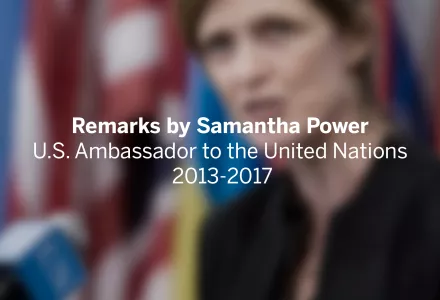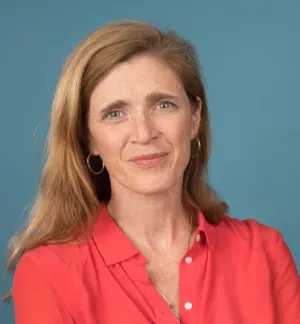
Good afternoon and welcome. I am thrilled to see several of my colleagues from Croatia, Afghanistan, and France. This is an American issue that we are here to discuss, but with broad international ramifications, which is why, I’m delighted as the U.S. Ambassador to the UN to be able to share with you a few reflections and then introduce the panel, which is spectacular.
I also want to give a shout-out to a group of school-kids from Brooklyn, whom I had a chance to meet with, it is called the School for Global Citizenship, and their interests in voting rights issues, but their commitment also to extend human rights assistance internationally and so they are the next generation that can take this forward [inaudible].
The Mission – and this room within the Mission – was designed with a vision to host events like this one, with friends from around the diplomatic community and civil society. Coming together today to commemorate the fiftieth anniversary of the Voting Rights Act seems like a perfect use of this space and this ideal. After all, it was a people’s movement that finally moved American legislators to guarantee African-Americans the right to vote.
The Voting Rights Act of 1965 is a seminal piece of legislation. It undid a more-than-90 year-old legal apparatus which stopped many African-Americans from voting – and it paved the way for greater participation and inclusion of African-Americans in this country’s process, to the great benefit of everyone. The story of the act – and its enactment – provides lessons to those of us working at the United Nations. We may be diplomats, but we should seize the spirit of this people’s movement to reinvigorate our work to defend human rights and dignity around the world.
And the spirit shines brightly in two of the civil rights leaders I’m honored to introduce here today. Wade Henderson is the president and CEO of The Leadership Conference on Civil and Human Rights and The Leadership Conference Education Fund. He is known to many of you and is known all around the world, and is a tremendous leader on all human rights issues. Sherrilyn Ifill is an author and voting rights litigator and I think her contribution, particularly in light of some worrying contemporary events is going to be extremely valuable, along with Wade’s. To lead our discussion, we are fortunate to have the deputy editor on the Op-Ed/Sunday Review desk at The New York Times, Sewell Chan. Sewell is the guy everybody is extra nice to when they want to get their op-eds placed in The New York Times so they can influence public discourse, so everybody be nice to Sewell, especially you young people who I look forward to futures of opinion assertion.
In 2015 it may seem very strange that a federal Voting Rights Act was necessary in 1965. In the aftermath of the American Civil War in 1865, the U.S. Constitution was amended to abolish slavery and to extend the vote to all American citizens, regardless of race. 1865. And yet, the promise of political inclusion was denied through the creation of an entire system of state and local laws, primarily in the American South, where I went to high school, that effectively kept Blacks from voting and participating in one of the core activities of democratic citizenship.
Today, it is breathtaking to see the blatantly arbitrary ways African-Americans were excluded. Take the literacy test, which didn’t just assess whether a potential voter could read but rather set a standard that was always shifting according to the whims of the local registrar. Obscure civics and legal questions, math and logic puzzles – these were unexpected and rapid-fire tests given to African-Americans, creating an almost insurmountable challenge.
One test from Louisiana asked potential voters to “write the word ‘noise’ backwards and place a dot over what would be its second letter should it have been written forward.” Take poll taxes, which imposed an exorbitant fee on voters. Working class and poor voters simply couldn’t pay. Couldn’t pay to vote. Add to this the hostile registrars, the limited hours that excluded the working class, the police harassment of voters waiting in line, and the widespread public intimidation of African-Americans who dared register to vote. It is no wonder, then, that in Dallas County, Alabama, where Selma was located, more than half of the county’s residents were Black, but only 1% were registered before the law’s enactment.
Of course, while these injustices mainly affected African-Americans, America as a whole suffered. The entire democratic system is diminished when citizens cannot exercise their right to vote. As Reverend C.T. Vivian from the Southern Christian Leadership Conference said to law enforcement officials in Selma, Alabama, “This is not a local problem; you can’t keep anyone in the United States from voting without hurting the rights of all other citizens.”
Many Americans in the 1960s realized this. They lamented the unfilled promise of equality under the U.S. Constitution and, when change finally came, it was because of the people who demanded it. Change was forged by a network of brave activists, local leaders from groups like the Student Non-Violent Coordinating Committee, the Southern Christian Leadership Conference, and the Dallas County Voters League. Their non-violent demonstrations, which culminated in the Selma-to-Montgomery March, shrewdly harnessed the power of media to tell the story of citizens redeeming their dignity and God-given rights in the face of a vicious system that beat men, women, and children and used dogs and tear gas to brutalize them. The power of their narrative jolted a nation, and it mobilized an even greater coalition, which in August 1965 finally got the House of Representatives, the U.S. Senate, and ultimately, the President of the United States, to enact the legislation.
The impact of the law was swift and almost immediately changed the parameters of political participation in the South. By 1969, the percentage of Blacks registered to vote had risen from 6 percent to around 60 percent, and 12,000 African-Americans were elected to public office. In this way, the Voting Rights Act moved the story of equality in the United States forward.
Now as we today mark National African-American History Month, American society is more equal and in many ways more inclusive than it was in 1965. But our work is clearly not finished, and there are Americans for whom the equality the law is supposed to provide is out of reach in practice. We continue to fight for them. And on the 50th anniversary of the march from Selma to Montgomery and the passage of the Voting Rights Act, we have to come together and defend this right, especially in the wake of the July 2013 mistaken Supreme Court decision to strike down Section 4 of this landmark civil rights law.
Now this is the very part of the law, and the panelists will discuss this, I am sure, the very part of the law that requires those parts of the country that have a history of voter suppression to run their practices through the federal government, for there to be a federal check on local practices to make sure that people really have the right to vote and that there is equality in this regard. This law, the Voting Rights Act that we are celebrating today is, as President Obama has said, a cornerstone of our democracy. Since the decision in July 2013, I want to underscore that Congress has done nothing to re-designate those counties and states that might require the kind of scrutiny that we know has been needed up until this point and what we are seeing is that states that used to need the pre-clearance of the federal government are taking advantage of the Supreme Court decision and they have passed new laws that are likely to make it harder for minorities or for people who are poor or disabled, to vote, through for example, requiring government-issued photo IDs to vote.
In this day and age, in the age of Apple computers and iPads, how is it that you could be making it harder and not easier to vote? It makes no sense, unless something else is going on. And so we need to join together, take advantage of this anniversary, take advantage of our learning of the history and our remembering of just how far we’ve come to come together, to rally, to press the Congress as President Obama did in his State of the Union address, to step in now and to make it very clear that we are not out of the woods that making equality real in 2015 is going to require that all of us be a part of the solution and looking to see what is actually happening in places that have a history of voter suppression and to ensure that there is mitigation that there is a federal check is a critical component of this.
So, we have real experts, not diplomats pretending to be experts, on the Voting Rights Act, who are here, we are honored that you are with us and thrilled that we have a crowd worthy of this discussion. And with that, Sewell and our wonderful panelists together. Thank you.
###
Power, Samantha. “Remarks by Ambassador Samantha Power at an Event to Commemorate the 50th Anniversary of the Voting Rights Act.” February 25, 2015


